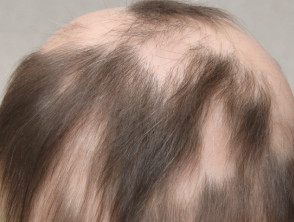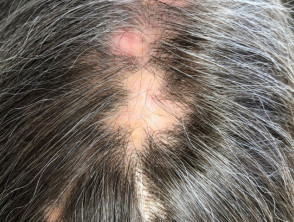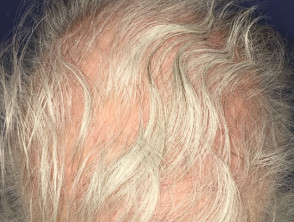What is hair loss?
Hair loss (alopecia) is a common problem that affects up to 50% of men and women throughout their lives [1].
Hair loss can be broadly categorised into scarring (cicatricial) alopecia and non-scarring (non-cicatricial) alopecia, with hair loss on the scalp further classified as focal or diffuse alopecia.
Hair loss can occur anywhere on the body, but most commonly affects the scalp. Abundant scalp hair has societal and cultural importance. Loss of scalp hair, eyebrows, and eyelashes frequently leads to psychological distress.
Hair loss
What are the causes of hair loss?
The main causes of hair loss depend on whether the type of hair loss is scarring or non-scarring, and focal or diffuse.
Scarring alopecia is rare and is caused by injury, infection, and inflammatory skin disorders such as discoid lupus erythematosus, lichen planopilaris, and folliculitis decalvans.
Non-scarring focal alopecia is usually caused by tinea capitis, a fungal skin infection, or alopecia areata (an autoimmune disorder).
Diffuse hair loss may follow hair shedding, which is usually stress-induced hair loss (telogen effluvium) or is due to genetically determined male or female pattern hair loss [2]. Diffuse hair loss can also be caused by alopecia areata, medications, and various systemic illnesses including anaemia, hyperandrogenism, and thyroid disease.
Psychiatric disturbances, such as acute anxiety and endogenous depression, have also been considered possible causes of diffuse hair shedding [3].
What else should I know about hair loss?
Whatever the cause, the more hair is lost, the lower the likelihood of regrowth.
- If the hair does grow back, there may be repeated episodes of hair loss.
- The hair that grows back may be different in colour and texture [4].
- Medical treatment for hair loss is limited, especially for the most severe forms of alopecia.
- Surgical options, such as hair transplants, can be used for specific types of hair loss but these have their own limitations.
What are the psychological effects of hair loss?
Research into the psychological problems associated with hair loss is limited.
The evidence confirms that the experience of hair loss is psychologically damaging, causing intense emotional suffering, and often leading to personal, social, and work-related problems. People with severe hair loss are more likely to experience psychological distress than those with mild hair loss [4]. The loss of hair changes a person’s looks, particularly when the eyelashes and eyebrows are affected as they define a person's face. Hair loss may be seen as a failure to conform to the norms of physical appearance within society [4].
The relationship between hair loss and psychosocial consequences may be complicated by hair loss that eventuates from a stressful experience or life event, which then leads to further distress, anxiety, and depression [5]. Women who experience high levels of stress are 11 times more likely to experience hair loss than those who do not report high stress levels [6].
Compared with the general population, people with hair loss have an increased prevalence of psychiatric disorders, including a major depressive episode, an anxiety disorder, social phobia, or a paranoid disorder [7].
What are the clinical features of anxiety/depression due to hair loss?
Hair loss may lead to depression, anxiety, and social phobia.
- Depression can lead to a feeling of low mood, lack of interest or pleasure in activities, loss of energy, and sleep deprivation.
- Anxiety can cause excessive worrying, difficulty in controlling those feelings, and a feeling of heightened tension. Patients may also complain of palpitations and sweating.
- Social phobia or avoidance behaviour follows on from the experience of anxiety symptoms, leading to social and economic suffering.
- Social anxiety disorder is characterised by the fear of humiliation or being judged negatively in social situations as well as the avoidance of such social or performance situations [8].
These symptoms can have a severe impact on an individual’s mental health, ability to work or study, and well-being.
What is the treatment for anxiety/depression due to hair loss?
Anxiety and depression caused by hair loss can be treated using cognitive behavioural therapy and support groups, as well as by medication such as antidepressants [9].
Psychological treatment is important for people with hair loss, but the best method is not certain and will differ from patient to patient. Research has predominantly been focused on the general issues of coping with hair loss rather than on specific psychological treatment strategies.
What further research is required on the psychological effects of hair loss?
A strong theoretical understanding of the psychological impact of alopecia is required, including knowledge of the immune system, the stress response, and psychological responses to hair loss. Appropriate treatment strategies and regimes need to be established, implemented, and studied in a clinical setting.
Self-consciousness about body image is consistently portrayed and commented upon in the media. The role of the media in emphasising an expectation of a full head of hair should be explored, as well as how it can be used to educate society about hair loss and tolerance of people’s physical differences.


